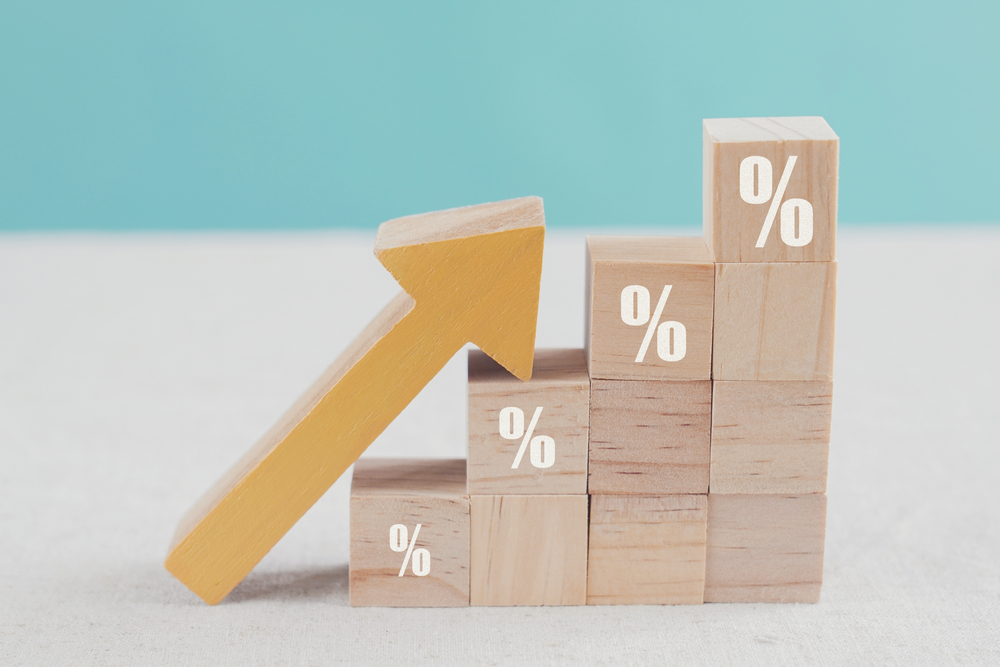Blog
What you need to know about rising interest rates

Higher interest rates can be worrying for investors, but they don’t need to cause panic if you are taking a long-term view.
Interest rates have risen sharply this year as central banks around the world try to tame inflation.
Earlier this month, The Bank of England hiked interest rates by 0.75 percentage points to 3%, the highest level since 2008 and up from just 0.1% in December last year. It was the eighth increase since the pandemic, with further hikes expected in the coming months.
Alongside higher mortgage costs for many borrowers, the prospect of higher rates has also hit financial markets this year. But it may not be all bad news, especially for investors who are in it for the long haul.
Here’s what rising interest rates mean for you.
Why are interest rates rising?
Prior to December last year, interest rates in the UK had been at an historic low of 0.1% since early 2020 as the Bank of England sought to prop up the economy in the wake of the Covid-19 pandemic.
However, the strong post-Covid recovery, tight labour markets, the war in Ukraine and the subsequent European energy crisis have pushed inflation (which measures the change in the price of goods and services) to multi-decade highs. The Consumer Prices Index (CPI) in the UK rose to 10.1% in the 12 months to September, and 11.1% in October.
When central banks like the Bank of England or the US Federal Reserve are worried about rising inflation, they typically raise interest rates. Their intention is to lessen the demand for goods and services by making it more expensive to borrow money, thus dampening inflation.
Are there further rises to come?
Yes, we believe that interest rates will need to rise into early next year as central banks aim to return inflation to their 2% targets.
Markets are currently expecting interest rates in the UK to increase to around 4.7% by mid-2023. However, there is a high degree of uncertainty around the path of future policy because much depends on the UK government’s fiscal policies, with tax rises and spending cuts expected in the Autumn Statement today (17 November).
What do rising interest rates mean for shares?
When interest rates are low, it costs less to borrow money, which means companies can invest and grow their businesses more cheaply – which can boost their share prices in the long run.
It also means investors may be willing to pay more for shares since they potentially offer better returns than the low interest they are getting on their cash savings.
But when central banks are raising interest rates, it can mean there is less fuel for growth, which can weigh on stock markets. Markets may start to worry that central banks will raise interest rates too much and choke the economy rather than moderate it.
Further down the line, once the uncertainty over the state of the economy and the outlook for inflation and interest rates is resolved, share prices may recover – even at higher rates. Plus, if higher rates make economic growth more sustainable, that can be good news for shares too.
And what about bond markets?
Bonds are a type of loan that investors make to governments or companies. The investor lends money to the issuer and, in return, the issuer agrees to pay back the face value of the loan on a specific date in future and to pay interest on the loan, usually twice a year. This is called the coupon rate.
Like shares, bonds can be bought and sold in the markets after they have been issued, so their prices can fluctuate.
When interest rates are rising, bonds can become unattractive if rates rise above the coupon rate on bonds – why would you invest in a bond paying a lower rate than you can earn from just keeping money in a bank account?
In that situation, bond prices will fall. But for long-term investors, the conclusion isn’t to ditch bonds when rates are rising and bond prices are falling.
In fact, rising rates should ultimately benefit bond-fund investors over the medium- to long-term. As older bonds mature, your money will be reinvested in higher-paying bonds that can generate better total returns.
Aside from that, bonds have tended to act as a powerful diversifier or volatility dampener to shares in a recessionary environment, which typically weighs on share prices. While bond and share prices have fallen in tandem this year, the longer-term relationship has historically been that bond prices tend to move in the opposite direction to shares.
What should I do (if anything) about my investment portfolio?
An uncertain economic and market environment, such as we are in now, is one of the key reasons to have a globally diversified portfolio, not only across shares and bonds but also across different regions and sectors. This will mean you are not overly exposed to the risks in any one market.
And while a change in the interest-rate environment may mean some short-term pain, we believe staying the course and remaining focused on your long-term goals is usually the best course of action.
Roxane Spitznagel is an economist at Vanguard